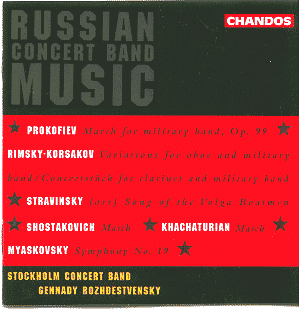RUSSIAN CONCERT BAND MUSIC
PROKOFIEV March for military band
(1943)
RIMSKY-KORSAKOV Variations for oboe and military
band
RIMSKY-KORSAKOV Concertstuck for clarinet and military
band
STRAVINSKY arr Song of the Volga
Boatmen
SHOSTAKOVICH March of the Soviet Police
(1965)
KHACHATURYAN Soviet Police March
(1975)
MIASKOVSKY Symphony No. 19
(1938)
 Alf Nilsson (ob) Solve Kingstedt
(cl)
Alf Nilsson (ob) Solve Kingstedt
(cl)
Stockholm Concert Band/Gennadi Rozhdestvenski
rec Stockholm, 11-12 June 1995
 CHANDOS CHAN
9444
[54.44]
CHANDOS CHAN
9444
[54.44]
Amazon
USA

The main draw for this disc is the Miaskovsky but first of all let's survey
the other items.
The Prokofiev is bluff, cheeky and brash in line of fire from the famous
Love of Three Oranges march. The Rimsky oboe piece is quite symphonic and
sensitive in feel rather leaning towards the music you encounter in Tchaikovsky's
four orchestral suites and ending with extensive variations on the Russian
folk song The Birch Tree as used by Tchaikovsky in the fourth symphony. The
clarinet piece is as bubblingly mellifluous as anything by Crusell or Weber.
The Stravinsky reworking of the Volga song is disruptive and harsh - very
acceptable! The Shostakovich is as bumptious as can be, almost Viennese
bandmasterish and smacking of Sousa without the billowing horn waves.
Khachaturyan's much later counterpart to Shostakovich's effort is in fact
much closer to Sousa - trenchantly triumphant - a real foot-tapper with a
more inspired (but brief) central rumination.
The Miaskovsky has been available before in various Russian recordings. The
one most likely to have been encountered is the Olympia OCD 105
(USSR Ministry of Defence Band/Lev Mikhailov). The work was inspired
by hearing his own eighteenth symphony in wind band arrangement. The four
movements have never been heard before to such fine advantage. Stereo separation
is excellent. The sound (superior to the Olympia disc which in any event
is no longer available) reminded me of Reference Recordings' enviable CDs
of Holst's and Arnold's wind band music. The music itself is, in the case
of the first movement, quite Holstian in that warm positively mellifluous
and enveloping way we find in the two suites. Both the first and finale movements
are rhythmically active - mordant and unexpected in terms of mood. The second
movement might almost have been an inspiration to Malcolm Arnold in the romance
of the English Dances but also in their gracious sense of the eternal dance.
The Andante serioso presents a more familiar Miaskovsky speaking in sombre
tones, chilly, cradled in nostalgia. Overall though this is not the Miaskovsky
of Symphonies 3, 5, 6, 24, 25 or 27.
The playing time of the disc is not long (with 26.44 for the Miaskovsky)
but such are the curiosity and musical values that one can forgive this omission.
Still what a pity they did not go the whole hog and offer Shostakovich's
Solemn March, Prokofiev's Oranges, Spartakiad, and the other two concert
marches. There are other concert band pieces by Rimsky, Khachaturyan's many
marches including the Field March No. 1, To the Heroes of the Great Patriotic
War etc.
Good notes and, in summary, a collection that left me wanting more.
There should be a volume 2.
Rob Barnett

